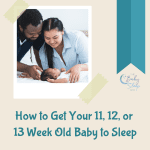
Previous: How to Get My 5, 6, or 7 Week Old To Sleep
Can you believe it!? Your little one is now 2 months old and beginning to really take notice of the world! As exciting as it is to see your baby LIGHT UP when you introduce a new toy… have you ever complained your baby “just can’t seem to settle to sleep now that they’re so aware”? For a lot of parents, sleep deprivation really begins to take its toll after the first 8 weeks, whether or not your baby is sleeping “fine” at 5, 6, or 7 weeks old. Around this time, some babies begin waking up even more often at night or needing to be rocked/bounced/walked/fed longer and longer before they can be put down without POPPING wide awake! Not to worry, we’ve been there and we have just the tips to help you navigate this bleary-eyed stage of parenting. 🙂
Let’s take a look at the 6 steps to help your 8, 9 or 10 week old baby sleep.
In those first few weeks when all your baby did was SLEEP you probably wondered, “When will my baby start staying awake longer during the day?” And, now, you may be asking yourself, “When will my baby begin sleeping longer at night?” Whether your baby suddenly cannot nap anywhere other than your arms or wakes up frequently at night, you are not alone! And, we have the keys to getting your 8, 9 or 10 week old (and YOU) the best sleep possible!
How To Get My 8, 9 or 10 Week Old To Sleep At-a-Glance
- Develop a consistent sleep routine
- Review your baby’s schedule
- Consider gentle sleep coaching/training
- Create a sleep plan for your family
- Gather support from your village
- Prepare for the next sleep speedbump
And, now for a few details…
1. Develop a sleep routine for your 8, 9 or 10 week old
Setting the environment for sleep is crucial and part of cuing your baby that it’s time for sleep is to have a consistent set of steps you do each sleep period, at night and at nap times. The sleep routine should be short and sweet at this age. For example, dim lights, close curtains, change your baby’s diaper, sing 1-2 lullabies, nurse or offer a bottle, cuddle the baby for a few minutes while burping, and then lay your baby down for sleep while saying a key phrase (e.g. “I love you. Time for sleep. Night night.”). The younger your baby, the shorter the routine should be. After all, 2 month old’s have very short awake periods and if we miss their sleep window, LOOK OUT!
2. Review your 8, 9 or 10 week old’s schedule
Don’t have a schedule yet? Now’s the time to start thinking about how to form a loose sleep schedule for your baby. It’s unrealistic to expect 100% consistency from your baby at this age, but you should be able to predict at least what time your baby will wake for the day (within 30 minutes plus/minus), when the first nap will begin, and perhaps bedtime. Families, depending on their situation, can’t always stick to a set schedule as well as others, but just do your best. What type of schedule you ask? Check out our sample schedules here or make your own custom schedule!
3. Consider gentle sleep training (or coaching) for your 8, 9 or 10 week old
If the previous steps haven’t significantly improved your 8, 9 or 10 week old’s sleep and you’ve downloaded our free e-Book, 5 Ways to Help Your Child Sleep Through the Night, it’s likely your baby has sleep associations that need to be resolved with gentle sleep training. Ideally, you’d get a professional assessment of your baby’s sleep challenges, but if you feel certain a dependence on parental help is part of the issue, then you may want to consider gently sleep coaching your baby towards more independent sleep. This essentially involves helping your baby learn to fall asleep with less help from you – over time and with plenty of reassurance and comfort from you along the way. Given your baby’s age and our experience, however, we do feel strongly this should be done using a very hands-on, gentle sleep coaching method that limits crying.
Not sure where to begin? Check out Gentle Sleep Training Explained + 5 Strategies
4. Create a plan for your 8, 9 or 10 week old
If you’re considering gentle sleep training, you need to figure out what to do next. Some of us are planners and others simply “wing it.” If you’re not a planner, you can certainly skip this step, but if you’ve been trying to help your 8, 9, or 10 week old sleep for a while now, you’ve developed a routine, reviewed the schedule recommendations for 2 month olds and plugging along without a set strategy isn’t working out so well, maybe a plan is just what you’re missing. After all, it’s hard to know how to get to where you’re going without a travel plan. Make the plan as detailed as you want it, but having a step-by-step plan helps you stay on track, committed, and consistent. Not sure where to begin or need help creating your baby’s sleep plan? Consider making your own sleep plan or letting us create a Personalized Sleep Plan™ for you and your baby.
5. Get support for your 8, 9 or 10 week old’s parents (you!)
We hear everywhere that “it takes a village” to raise a child, but gone seem to be the days where we have a lot of help nurturing our babies. I don’t know about you, but my mom came out for one week when my first baby was a newborn, but that was about it. My husband and I were largely on our own. No Aunts to regularly hold the baby while I took a nap or enjoyed a (hopefully hot) meal. So, getting through this 8, 9 or 10 week old trouble spot can be tough without support. We sometimes have to recruit our own village. Consider hiring a sleep consultant or asking your partner, friends, or family members to help you implement your sleep plan. Having a support system in place can make all the difference in the world in reaching your sleep goals!
6. Prepare for your 8, 9 or 10 week old’s next speedbump
Whether you’ve already made some progress getting your 8, 9 or 10 week old to sleep or you’re just beginning your research into helping your baby sleep, it’s important to never lose sight of “what’s next.” Why? Because babies are constantly changing! So be prepared and make sure you plan ahead, and have a game plan in place, before the next sleep regression or speedbump emerges. Around 4 months old your baby may experience their first sleep regression. What’s a “sleep regression” you ask? Now’s the time to begin thinking about how you’ll help your baby through any potential setbacks (teething, travel, and illness are BIG ones!) – sometimes the key to overcoming or even avoiding setbacks is understanding when they are likely to happen and having a plan in place for how you’ll get through them!
Is your baby a bit older and not sleeping well? Check out our article: How to Get Your 11, 12, or 13 Week Old Baby to Sleep!








